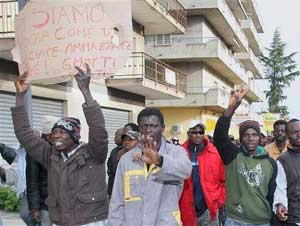By Monica Moorehead
The worldwide capitalist economic crisis is hitting tens of millions workers hard to one degree or another, be they in the poorer nations or the rich capitalist countries. Many of these workers are forced to migrate from their beloved homelands to look for work that will provide a decent wage to help them and their families survive.
Immigrants are amongst the most exploited and oppressed workers. They make tremendous profits for the capitalists. Not only do the bosses pay them starvation wages with no benefits, but many face political and social injustice, especially racism. The recent developments in Rosarno, Italy, are a prime example of this outright bigotry and repression.
In Italy sign reads: ‘We are people like you,
don’t let them kill. 6 are dead.’
On Jan. 7, African migrants, including some from Nigeria and Togo, rebelled against racist attacks by white Italians and the police in this working-class town near the western coast of Calabria. Many of these workers, who are both documented and undocumented, work in the citrus groves in the poorly developed southern part of the Italian peninsula.
Characterized as “rioting” by bourgeois news sources in order to demonize the justifiable nature of the rebellion, some African immigrants were provoked to rebel when an immigrant was shot by a vigilante in a nearby city. It has been reported that organized crime figures helped to instigate the attacks.
The immigrants used rocks to fight back and torched cars against the vigilantes and the police. Some migrants were shot with pellet fire and beaten with metal rods, warranting surgery.
On the weekend of Jan. 10, more than 1,000 African workers were transported to detention centers, which are nothing more than jails, for an indefinite amount of time with no charges.
Thousands of African workers pick fruit during the harvest season for many hours a day for less than $200 a week. This is work that many native-born Italians feel would be degrading for them to do.
The rebellion reflects the deepening economic crisis in Italy and Europe in general: In the absence of a strong anti-racist, pro-working class movement against the bosses, migrants are being scapegoated for the loss of jobs. Public statements and policies of the xenophobic, right-wing government of Silvio Berlusconi have given the green light for these racist attacks to intensify.
Treated as social outcasts, these African migrants are forced to live in makeshift shanty towns with much of the housing being subhuman. On behalf of the tourist industry, a majority of these makeshift houses have been bulldozed at the same time these workers are being detained.
A spokesperson for the International Organization for Migration in Italy, Flavio Di Giacomo, commented, “This event pulled the lid off something that we who work in the sector know well but no one talks about: That many Italian economic realities are based on the exploitation of low-cost foreign labor, living in subhuman conditions, without human rights.” (New York Times, Jan. 11) He went on to describe the conditions of the African migrants as “semi-slavery.”
The Italian section of the Anti-imperialist Camp, commenting on the rebellion of the African workers in Rosarno, while recognizing the extreme poverty of the region, made it clear that “We must be on the side of the Black laborers, no ifs or buts. ... It is a good thing that they have risen in rebellion, demonstrating that if they are human beings, the others are no more than pigs.” (campoantimperialista.it)
This is not the first time that African migrants have been targeted in southern Italy. In 2008, six Ghanians were killed, execution-style, resulting in a rebellion near Naples.
Articles copyright 1995-2010 Workers World. Verbatim copying and distribution of this entire article is permitted in any medium without royalty provided this notice is preserved.
